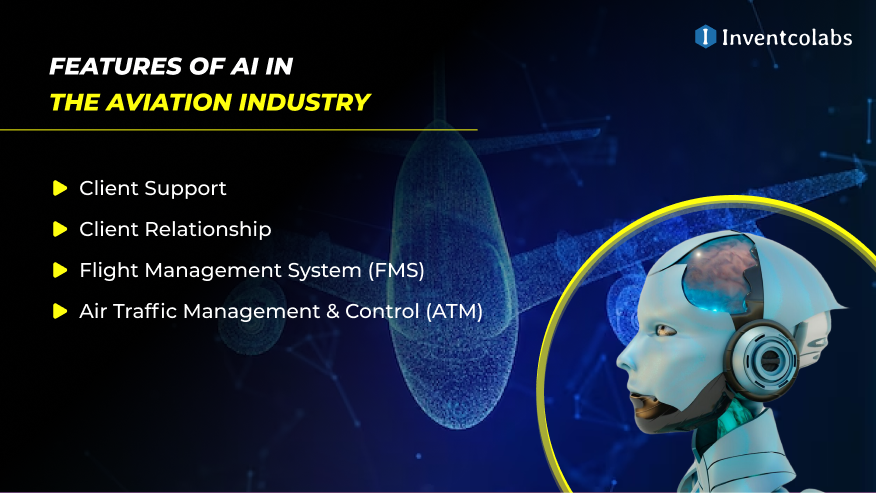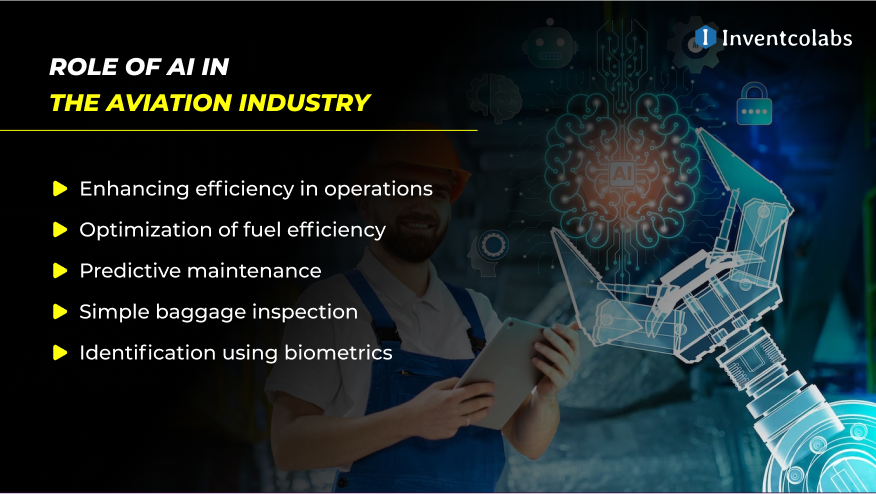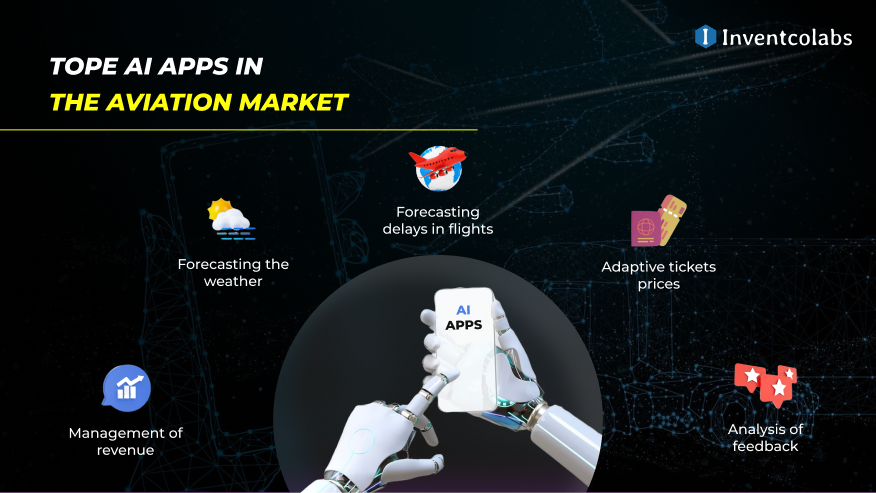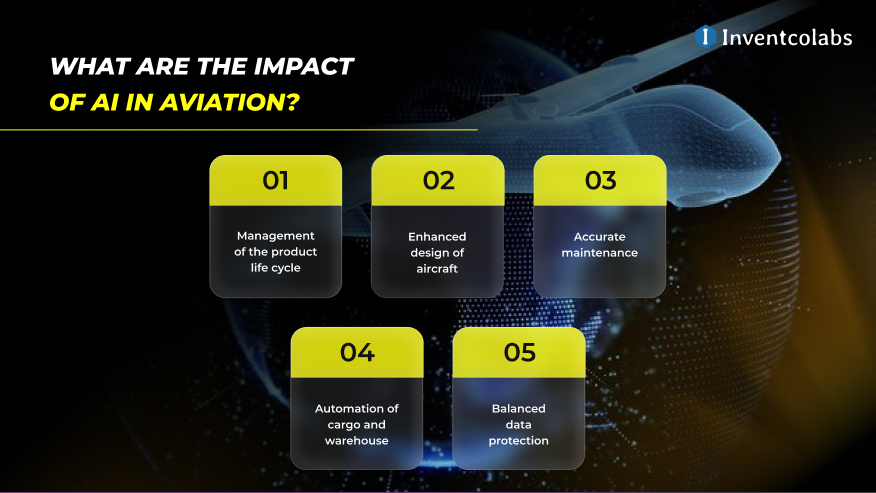The field of Artificial Intelligence (AI) is expanding quickly and changing the industrial environment. AI is transforming a lot of industries, including airlines, and increasing productivity and efficiency. AI is revolutionizing aviation in several ways, including crew planning, airport safety, air traffic control, and aviation management software. This post is all about the impact of the application of AI in reshaping the aviation industry.
What is AI in the Aviation Industry?
Artificial Intelligence in aviation industry fosters invention in customer care digitization, transportation and operations oversight, and customer engagement. Artificial Intelligence is revolutionizing aviation by optimizing traveler check-ins, baggage management, and security checks. This enhances airport accessibility and performance.
How Artificial Intelligence is Revolutionizing Industries?
Gate-to-gate operation is now possible without a need for human intervention thanks to AI-powered fully automated flight control systems that have supplanted piloting technology’s fundamental components. The use of the best aviation software is changing operations and shaping the industry’s future, in addition to modernizing operations. Artificial Intelligence has played a pivotal role in augmenting safety protocols, boosting efficacy, diminishing expenses, and raising customer service standards.
Predictive maintenance is now feasible because of machine learning algorithms, which can detect any problems before they arise, averting expensive delays and guaranteeing passenger safety. However, AI is not just altering aircraft flight patterns; it is also revolutionizing almost every facet of ground-based aviation. The aviation sector has looked into ways to profit from AI and machine learning technology as it has developed recently, to improve process efficiency and frequently increase safety.
Why is AI important in the Aviation industry?
Beyond just improved customer experiences or financial gains, AI software development companies have a significant impact on aviation. It is essential to enhance safety precautions. Because automated systems are more accurate at predicting weather changes than human pilots, there is less risk to the flight. Artificial Intelligence is changing the aviation industry by boosting productivity and revenue while also enhancing safety. Artificial Intelligence has a chance to significantly improve aircraft security and dependability while also reducing costs and interruptions, which is why the aviation industry is so keen on using it in service.
Predictive maintenance enabled by AI can also increase safety by seeing any problems before they endanger crew or passengers. This may result in fewer delayed and canceled flights as well as improved traveler satisfaction. In addition, airports are becoming more passenger-friendly thanks to aviation software development solutions and personalized experiences, guaranteeing that air travel will become more intelligent and pleasurable in the future.
Features of AI in the aviation industry

Client support
AI is achieving remarkable progress in terms of client retention and happiness. It’s undeniable that cancellations and delays can ruin any trip’s start. The next time they travel, even the most devoted patrons might second-guess choosing to fly with their preferred airline. Airlines are using AI to give their customers tailored service, which enhances the flying experience.
Client relationship
In commercial aviation, customer satisfaction and service quality are critical factors. The application of Artificial Intelligence in aviation will help airlines to be the best in customer engagement and customer service. Chatbots, a type of AI programming software, are computerized systems that could reply to customer questions instantly. Choose a mobile app development company to create Online chatbots that can automate customer service, saving businesses time and effort.
Flight Management System (FMS)
A customized computer system called a FMS reduces workload during a flight, negating the need for engineers or navigators to be on board. Consider it as an advanced GPS combined with airplane tracking features. The plane can be sent in a new, more advantageous direction by recalculating the route based on real-time data about weather storms, turbulence, increased air traffic, or other unfavorable conditions.
Air Traffic Management and Control (ATM)
Air traffic management is one of the vital duties for which AI in aviation is becoming more and more beneficial. The automation of numerous airspace management processes, including flight planning, route optimization, conflict identification and resolution, and demand and capacity balancing, is one of the primary advancements AI offers to ATMs.
Role of AI in the aviation industry

Enhancing efficiency in operations
AI-powered flight route optimization has a large potential to save operating costs and increase profitability for the aviation sector. Large volumes of data may be analyzed by AI algorithms, which can then be used to forecast weather trends, optimize fuel use, and recommend the most practical routes. Performance is increased and overhead is decreased when AI is used to optimize aircraft operations. Hire dedicated developers to develop the best AI aviation software for your airline.
Optimization of fuel efficiency
Aviation contributes to nearly 2% of CO2 emissions globally, prompting airlines and aircraft manufacturers to enhance fuel efficiency through AI systems and machine learning algorithms.
Predictive maintenance
AI enhances safety by predicting potential aircraft malfunctions and failures, reducing maintenance expenses, and improving pilot and passenger safety, thus enhancing overall aviation safety.
Simple baggage inspection
An Artificial Intelligence-based robotic aided convenience system that swiftly troubleshoots and diverts high-risk baggage for further examination is used to screen passenger-checked baggage more effectively. Modern facial recognition AI aviation software allows for considerably faster access and provides insights into people’s spatial movements in real-time.
Identification using biometrics
Check-in requests are only one of the numerous ways that AI may help customers. AI technologies are not only useful for passenger identification but also for airport inspection. Passenger identification will be made quicker and simpler with the use of biometric identification using AI and security scanners.
Top AI Applications In Aviation Market
AI can help engineers and maintenance managers make wise judgments. Aviation maintenance software can improve operational efficiency by offering insights into maintenance planning, resource allocation, and fleet performance optimization through the use of machine learning and data analysis techniques.

Management of revenue
A single, solution-based environment for AI aviation software development is essential for optimizing aircraft operations and simplifying revenue management. Revenue management experts use AI well to discover destinations, adjust pricing for certain markets, locate efficient distribution methods, and manage seats to keep the airline both competitive and customer-friendly.
Forecasting the weather
Weather forecasting is another aspect of predictions. Artificial Intelligence is used to forecast whether or not the weather is acceptable for flying. Artificial Intelligence is utilized to forecast flight safety and to provide alternate routes with weather conducive to flying. Artificial Intelligence is useful in forecasting renewable energy and in predicting the duration of storms and aviation turbulence.
Forecasting delays in flights
While weather and other airport operations are just two of the many variables that can cause delays in flights, real-time data analysis using predictive analytics can assist in predicting delayed flights, adjusting departure times, and even rebooking customers’ flights.
Adaptive ticket prices
Dynamic pricing is a technique used by Artificial Intelligence in the airline industry. It’s a method of setting prices at the most lucrative levels given the circumstances. Dynamic pricing algorithms often make use of clever techniques like big data analysis and machine learning. Even though you might not think much of this solution, the truth is that it’s the most widely used AI application in aviation.
Analysis of feedback
Airlines may enhance customer service by using data analysis to identify issues with the airport and flight experience. Airlines may exceed customer expectations and make well-informed decisions by utilizing Artificial Intelligence (AI) for market research and feedback analysis. Airlines can swiftly ascertain whether there is a chance to favorably intervene in the customer journey and transform a negative experience into a positive one by utilizing AI technology.
Read more: How To Create An Artificial Intelligence App?
What is The Impact of AI in Aviation?
The aviation industry is poised to be significantly impacted by AI technology, particularly machine learning and robotics, as the pandemic prompts a focus on digital transformation projects.

Management of the product life cycle
Because AI makes it easier for brands to better understand their product life cycles, its influence in aviation PLM is expanding. AI for aviation uses available data to identify new opportunities and enhance product categories, ranging from examining historical production patterns to forecasting future design trends. Tech pack construction in the PLM process can be driven by predictive modeling, which is used in aviation design, greatly reducing non-value-added time. Aviation engineers will have more time to concentrate on innovation and creativity if this critical PLM component is automated, which might also result in significant time savings and increased profitability.
Enhanced design of aircraft
New airplane designs can be created and assessed using generative AI.AI assisted software development can help engineers in designing more effective, safer, and maintainable aircraft by analyzing data on aerodynamics, fuel efficiency, and other factors.
Accurate maintenance
Airlines can forecast when aircraft components will break by using generative AI to examine sensor data. By doing this, airlines can lower aircraft downtime and prevent expensive unscheduled maintenance.
Automation of cargo and warehouse
An AI software development company has opened the door to improved freight operations and the possible application of unmanned aerial vehicles, or drones, in warehousing settings. AI integration in the aviation industry has increased dramatically, revolutionizing conventional techniques with sophisticated algorithms. AI integration in warehouses has improved safety protocols and raised productivity.
Balanced data protection
Data protection and antitrust regulations must advance along with the aviation industry’s rising adoption of AI to preserve fair competition, secure personal data, and maintain a balanced power dynamic between customers and providers.
Real-World Implementations of AI in Aviation
Maintenance and secure operations: Making aircraft upkeep more secure, more efficient, and more reasonably priced is essential for the welfare of the airline, the flight crew, and the customers.
- Computer vision is a tool that UAVs employ to gain more autonomy in piloting and surrounding perception.
- The National Test Pilot School (USA) is using augmented, hybrid, and machine-learning technologies to improve safety during flight testing.
- The European Aviation Safety Agency (EASA) has launched the Artificial Intelligence Roadmap 2.0, which highlights the importance of a human-centric perspective on AI in aviation.
- Predictive maintenance technologies driven by AI have been put into place by Lufthansa Technik. Their Condition Analytics technology analyzes sensor data from aircraft components and forecasts maintenance needs using machine learning algorithms.
What are The Challenges Ahead?
AI systems should be carefully tested and validated before being implemented, as with any complicated technology, since there is a chance of mistakes and malfunctions.

Ethical concerns:
The application of Artificial Intelligence in aviation gives rise to ethical questions around bias, data privacy, and employment displacement. AI in pilot training, for instance, may make fewer human pilots necessary, which would result in employment losses in the sector.
Integration with current systems:
Air traffic control and aircraft maintenance systems, among other current aviation systems, need to be integrated with generative AI systems. Because of the intricacy of these systems and the requirement to make sure that the new technology doesn’t interfere with ongoing operations, this can be difficult.
Data quality:
To provide reliable results, generative AI needs a lot of high-quality data. In the aviation sector, getting this data might be difficult because of things like complicated aircraft systems and worries about data privacy. To guarantee AI’s appropriate and moral application, the aviation sector needs to solve issues with privacy, security, ethics, and human-machine interaction. The challenges and obstacles surrounding the mainstreaming of AI must be addressed to ensure that technology is used in a way that serves both the public as well as the aviation industry.
Conclusion
In conclusion, the integration of innovative tools and Artificial Intelligence is driving a dramatic transformation in the aviation industry. Artificial Intelligence in aircraft maintenance and services can improve customer satisfaction, reduce downtime, increase productivity, and enable more sophisticated automation and decision-making.
FAQs
Q. How does machine learning fit into the aviation industry?
ANS. Machine learning algorithms and IoT can reduce maintenance costs for carriers by monitoring aircraft technical conditions in real-time, detecting anomalies, and alerting technicians of potential issues.
Q. What role does AI play in airplane security and safety?
ANS. AI technology improves airport safety by enabling cameras with video analytics capabilities to detect potential threats, improve situational awareness, and automate response during high-impact situations.
Q. Will AI take the position of engineer in aircraft?
ANS. Although AI is capable of recognizing trends and discrepancies, it lacks human perception and decision-making talents. As such, AI cannot replace human workers in aviation engineering.
Q. What part will Artificial Intelligence play in the future of air traffic control?
ANS. Over the coming decades, it is expected that the structure of air traffic control systems will undergo substantial development due to the emergence of Artificial Intelligence and the expansion of VAVs.





